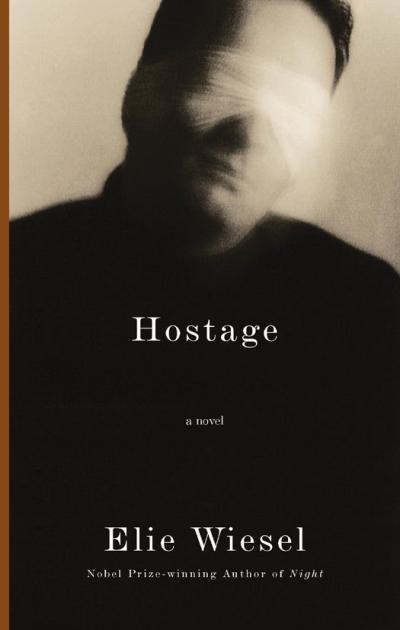
Hostage
A novel
کتاب های مرتبط
- اطلاعات
- نقد و بررسی
- دیدگاه کاربران
نقد و بررسی

May 21, 2012
A provocative “what-if” premise propels Nobel laureate Wiesel’s (Night) latest novel. In 1975, an Orthodox Jewish man, Shaltiel Feigenberg, is kidnapped from a Brooklyn street and held hostage by two terrorists, an Arab and an Italian, who demand the release of Palestinians and threaten death if their demands aren’t met. Shaltiel, a kindly storyteller, ruminates on the blessings of Judaism and recalls the words of Jewish prophets, philosophers, and mystics with nostalgia. He also remembers the moral ambiguity of being hidden in his native Galicia by a Nazi officer while his family labored in Auschwitz. Wiesel deplores ideologies that mislead and betray, including the communism that lured Shaltiel’s brother in the 1930s. As Shaltiel’s Arab captor spews hatred and his Italian captor speaks for international terrorism, Shaltiel claims that the excesses of Israel’s treatment of Palestinians are unavoidable safety measures. While the clock ticks closer to the deadline, Wiesel’s narrative skills fail to create tension, and Shaltiel’s rescue is perfunctory. Instead of a literary thriller, we get a didactic defense of the Jewish state and its timeless vulnerability. Agent: Georges Borchardt.

Starred review from June 15, 2012
Wiesel takes us on a journey through dream, memory and especially storytelling in his latest novel, which concerns Shaltiel Feigenberg, who in 1975 is captured and imprisoned for 80 hours in a basement by two captors. Feigenberg is politically unimportant and practically unknown before his capture, but soon thereafter he becomes front-page news, though his plight is reported in wildly different ways by the world press. His captors represent divergent political realities. One, Luigi, is an Italian political revolutionary with no particular animus against Jews, while the second, Ahmed, is a passionate advocate for Palestine with an intense hatred for the "Zionist cause." Perhaps predictably, a "bad cop-good cop" dynamic develops as they tend to Feigenberg, Luigi gradually freeing him from restraints while Ahmed rails with fanatic fervor against all that Feigenberg represents to him. Luigi and Ahmed are motivated by "humanitarian" concerns--they demand that three Palestinian prisoners be freed in exchange for Feigenberg's freedom--rather than materialistic ones. Feigenberg is mystified by his captivity, for he's simply a professional storyteller with a special fondness for spinning his tales to children and the elderly. This forced period of darkness ironically provides him with an extended period of enlightenment, as he has time to reflect on his life--the death of his grandmother at Auschwitz, his frequently absent but observant father, his initial meeting with Blanca (the woman who eventually becomes his wife), and the growing Communist sympathies of his older brother. He begins to frame the narrative of his life in much the same way he frames the stories he makes up to entertain others. Even the Israeli government--a government that notoriously does not negotiate with terrorists--gets involved in trying to track down the elusive captive. Nobel Peace Prize winner Wiesel continues to remind us of the brilliant possibilities of the philosophical and political novel.
COPYRIGHT(2012) Kirkus Reviews, ALL RIGHTS RESERVED.

March 1, 2012
Captured by an Arab and an Italian and tied to a chair in a Brooklyn basement, Shaltiel Feigenberg has been chosen to be exchanged for three Palestinian prisoners. To keep down his terror, he tells stories to himself and his jailers, recalling a childhood spent hiding from the Nazis (it's now 1975), liberation by the Soviets, Sixties unrest, and more. Nobel Peace Prize winner and novelist Wiesel continues exploring the Holocaust's continuing ramifications.
Copyright 2012 Library Journal, LLC Used with permission.

June 1, 2012
Wiesel combines his Holocaust focus with the contemporary Israeli-Palestinian conflict. Abducted on the streets of Brooklyn in 1975 and imprisoned in a basement room, Jewish writer Shaltiel Feigenberg is held hostage for three Palestinian soldiers, one imprisoned in the U.S., the other two in Israel. His captors send a message to his wife, who tells the police: if the Palestinians are not freed, Shaltiel will be executed. The prisoner's terse first-person, present-tense narrative will hold readers. Deprived of food and sleep, blindfolded, and tied to a chair, he tries to hold on by remembering his favorite stories and traditions and the miraculous history of his father's return from Auschwitz (his mother did not survive). The Arab captor, Ahmed, born in a Palestinian refugee camp, is brutal (his brother is in prison in Israel). The Italian captor, Luigi, is kind and sympathetic and wants to hear the prisoner's family history and the traditional tales of the Wise Fool: Is Luigi playing the good cop ? The stories and ruminations get a little messagey, but with the intense contemporary action, the prisoner's memories also bring close the sweep of Jewish history, including persecution and survival. Yes, he loves the people of Israel, but no, he's never been a threat to the Palestinians. Sure to spark discussion about Middle Eastern history and politics. HIGH-DEMAND BACKSTORY: Wiesel remains a mainstay in the Holocaust curriculum, a perennial book-group choice, and a recurring one book, one city selection.(Reprinted with permission of Booklist, copyright 2012, American Library Association.)

























دیدگاه کاربران